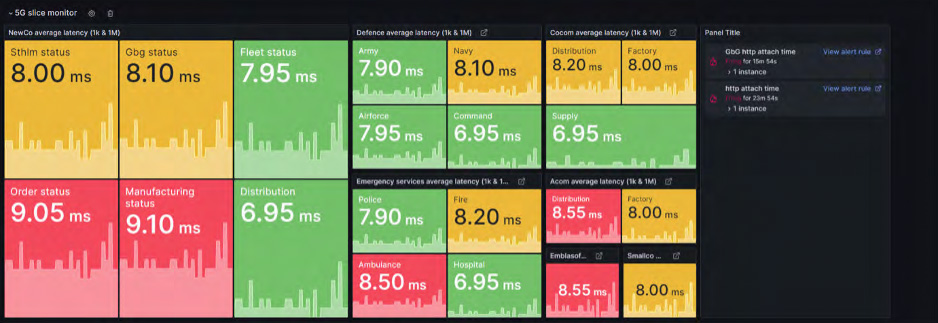
Multi-protocol testing covering 5G SBI, SS7 and much more for mobile networks - read more in the latest Evolver updates
Multi-protocol testing covering 5G SBI, SS7 and much more for mobile networks - read more in the latest Evolver updates
Emblasoft Evolver is the most comprehensive test and service assurance platform available. It supports legacy to 5G networks, multiple protocols and interfaces, and seamless integration with third-party applications. Explore new features and product enhancements in our updated product overview.
Mobile networks contain a seemingly dizzying array of protocols and interfaces. These range from legacy interfaces, such as SS7, all the way to the latest generation of Service-based Interfaces (SBI) for 5G. They ensure the smooth operation of control and user plane functions, as well as session management, correct billing and policy control and authorisation.
In other words, these protocols are fundamental to the operation of your mobile network. And, in any given session, multiple different interfaces may be required to support phases of the session. For example, in a VoLTE call, SIP will be used from the terminal to connect to the IMS core and VoLTE server, but the IMS will also check internally to determine authorisation rights and any policy information that might be required.
Similarly, online or offline charging will be applied, calling on another set of protocols. These interfaces and the functions they support in different mobile entities can all be tested in isolation, but that only tells part of the story – it doesn’t cover the end-to-end flow of actions that take place in the delivery of any given service. And, with services becoming more complicated, and involving not just multiple entities in the mobile core, but changes within an existing service – perhaps moving from one slice to another, or changing QoS parameters, we’re entering an increasingly dynamic service landscape.
So, if you want to validate each step, or to cover combinations of these steps, you must be able to support the different interfaces along the way – from the edge to the core, and back again. That matters, because every component must work seamlessly, with the correct interaction with others and changes that may be applied mid-session.
That’s why Evolver is designed to support multiple protocols, simultaneously. This means that, users can test both individual interfaces, and they can also create complex scenarios that cover the entire end-to-end flow. For example, setting up VoLTE calls, handing over to VoWiFi, moving to video and then back to VoLTE.
Similarly, legacy interfaces can be supported at the same time as current protocols – which means that interworking between, say PCRF and PCF can easily be covered, or roaming via CAMEL vs SEPP.
This flexibility is just one of the highlights covered in our latest Evolver product overview, which you can download, here.
Evolver is a flexible software-based platform that enables service validation and service quality assurance in fixed and mobile networks in scalable and end-to-end manner. It also offers active monitoring to ensure continuous service assurance throughout the lifecycle of any service or application, regardless of legacy platform.
Based on containerised software, Evolver can operate in isolation with any Network Resource Function, in cloud-native environments – and can also connect to multiple entities at the same time, enabling every step of any service to be modelled.
Evolver offers centralised control of comprehensive test and active monitoring programmes, to enable rapid, efficient continuous service integration and service delivery within a DevOps framework.
Evolver is optimised for 4G and 5G network testing and fully aligned with DevOps practices
It is optimised for the challenges of testing and assuring 5G SBA and SBIs, 4G, IMS, and legacy SS7 networks, and is fully aligned with CI/CD and CT strategies. It provides flexible, scalable, high-level functional testing and performance capabilities, as well a continuous active monitoring to ensure QoS throughout the lifecycle of any service or application.
Evolver also supports REST APIs, which means that it can be seamlessly integrated with a wide range of existing systems, applications, and business processes, and analytics tools, such as Prometheus or Grafana.

Figure 1: Example of Grafana dashboard: 5G slice monitor
Comprehensive test automation of real-world traffic scenarios
Key to Evolver’s flexibility is the ability to support multiple test modes in the same platform, at the same time:
- Active Monitoring – with real traffic sessions
- Functional Testing – quality control throughout the service lifecycle
- Performance Testing – extreme traffic load for scaling services
So, it can support a comprehensive assurance programme, at every stage of the service lifecycle. This flexibility also extends to the scenarios that can be covered under different test modes, because Evolver offers a comprehensive, powerful script editor, as well as a library of pre-configured test scenarios, ensuring real life traffic emulation at a granular level.
With respect to performance testing, it can generate the most extreme loads, which is ideal for the new level of throughput expected with 5G edge processing and applications that demand the lowest levels of latency – and to support applications across different slices.
Evolver also supports active monitoring using software agents in the network that can be controlled from a centralised platform. Agents can be installed dynamically and on-the-fly to test and validate QoS and assure differentiated services.
Of course, there’s much more, so to find out more about Evolver’s comprehensive test, validation, and service assurance capabilities and to understand its powerful feature set – download the latest Evolver product brochure by clicking here.